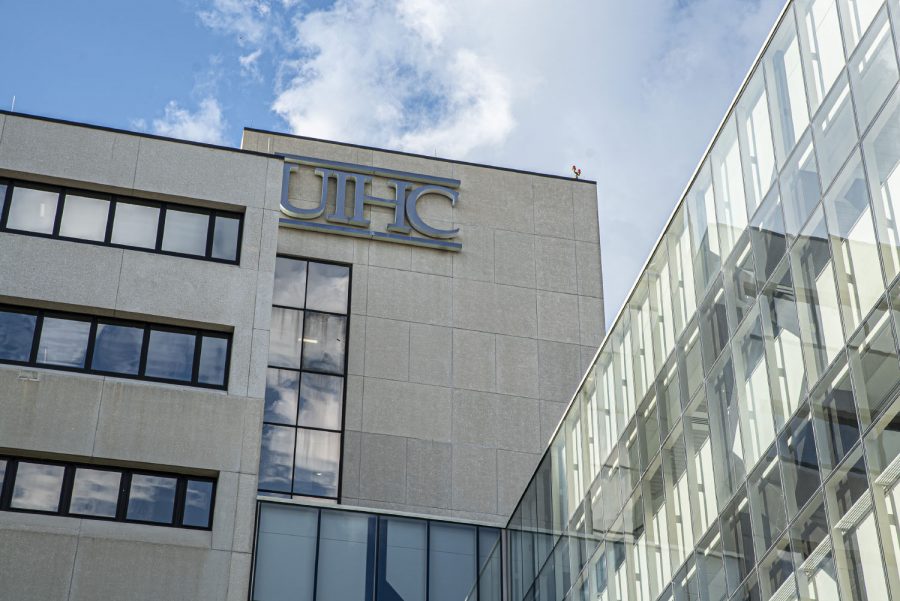UIHC performing trial to reduce celiac disease symptoms
A team of doctors and researchers at UIHC are conducting a study that has the potential to reduce common side effects found within those with celiac disease, one of the first hospitals to do so.
University of Iowa Hospitals and Clinics are seen on Tuesday, June 23, 2020.
September 24, 2020
David Elliott is currently investigating a trial drug that could help digestion for those with celiac disease, which causes an immune reaction to eating gluten.
Elliott, Director of the Division of Gastroenterology-Hepatology at the University of Iowa Hospitals and Clinics, said his team is studying larazotide — a compound known to decrease intestinal permeability — to see if will assist patients with celiac disease who are on a gluten-free diet.
“Most people with celiac disease, when they go on a gluten-free diet feel wonderful, and don’t have problems, but there are these small subset of individuals that still have some [gastrointestinal] complaints, even though they’re on a gluten free diet,” Elliott said. “That’s where this is targeted: for those people who have more difficulty with a loose tight junction… This drug may help that.”
Elliott, who is also a professor of internal medicine, said the team is actively recruiting participants for this study. One of the main requirements for participants is that they must have a positive serology and positive biopsy for celiac disease within the past six months to a year.
It is ideal if prospective participants experience ongoing symptoms associated with celiac disease, Elliott said, such as bloating, abdominal pain, abdominal cramps, and gas at least once a week.
Elliott said UIHC is one of the first hospitals to work directly with larazotide. While it has been studied in the past, this particular trial is in phase three of four, making it rather advanced.
RELATED: University of Iowa Hospitals and Clinics seeing sicker patients
Jessica Valestin, clinical research manager in Elliot’s division, said the research group is optimistic about the trial’s potential outcomes and how it will affect individuals with celiac disease.
“Our group chose this study as we believe in helping others and moving science forward,” Valestin. “We were very excited at the chance to potentially be able to help patients suffering with celiac disease.”
Elliott said the drug will be taken as a pill, and will help patients determine what is directly causing their symptoms and how they can reduce them.
“If this pill helps, then it’s something we can give people, and if it removes their symptoms say, ‘Oh no — you’re doing fine, you’re gluten free — the problem that you’re having is because of this,’” Elliott said. “Then they can decide if they want to stay on the medicine or whether they want to go off the medicine.”
He said in previous trials, it was believed that participants could eat gluten while taking the drug, as it walls off gluten and allows them to return to a more common diet.
This previous trial was not successful because the symptoms of celiac disease returned. However, the team discovered patients’ discomfort associated with celiac disease was reduced while on a gluten-free diet while also taking larazotide, he said.
The discovery initiated the current trial to see whether the drug helps tighten the gut, decreasing the amount of gluten traveling between the intestinal cell wall, rather than through it. If so, Elliott said, it will aid in lessening the discomfort experienced with celiac disease.
RELATED: University of Iowa Hospitals and Clinics seeing sicker patients
UI senior Ethan Upchurch said he was diagnosed with celiac disease in 2016, and currently serves as the community outreach coordinator for the UI Celi-Yaks Club.
The Celi-Yaks aim to decrease the challenges of navigating the college food scene and promote advocacy and awareness of celiac disease and other forms of gluten sensitivity.
Upchurch said the goal of the current investigative trial corresponds with the club’s goals.
“Our mission statement sort of lies in the same vein as the study does — we’re just trying to approach [celiac disease] from a different angle,” Upchurch said.
Upchurch has participated in past studies and is currently in the process of applying and being accepted for the current clinical trial conducted by Elliott.
“I had completed one about a year ago, and to be honest, on top of the benefits of just promoting celiac research, the compensation is really great,” Upchurch said.
Upchurch said he received $1,500 for participating in a former study regarding celiac disease. He said he feels more comfortable participating in the current trial as it involves routinely taking a pill, rather than using injections of a specific compound on a daily basis — something he had to do in the previous trial he participated in.
“It did seem a bit less invasive than the other one,” he said. “The initial study that I had done, that involved giving myself injections in my abdominal area, and that was just a bit much for me, it wasn’t super painful or anything, it was just kind of annoying to have to stay regiment with that and consistently give myself shots in the abdomen every day.”
Upchurch said this research gives him hope for the future of celiac disease and the symptoms associated with it.
“It’s refreshing to see that there’s research that’s being done out there,” the senior said.
Valestin said their research group aims to positively impact patients and initiate the development of medication that will help those living with celiac disease.
“Our group hopes to improve patient’s overall quality of life, especially those who live with a chronic illness,” said Valestin. “Clinical trials offer hope for better medications for the future.”






